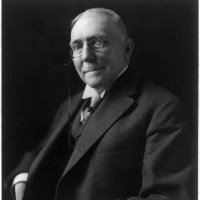Heat
There was a curious quiet for a space
Directly following: and in the face
Of one rapt listener pulsed the flush and glow
Of the heat-lightning that pent passions throw
Long ere the crash of speech.—He broke the spell—
The host:—The Traveler’s story, told so well,
He said, had wakened there within his breast
A yearning, as it were, to know _the rest_—
That all unwritten sequence that the Lord
Of Righteousness must write with flame and sword,
Some awful session of His patient thought—
Just then it was, his good old mother caught
His blazing eye—so that its fire became
But as an ember—though it burned the same.
It seemed to her, she said, that she had heard
It was the _Heavenly_ Parent never erred,
And not the _earthly_ one that had such grace:
‘Therefore, my son,’ she said, with lifted face
And eyes, 'let no one dare anticipate
The Lord’s intent. While _He_ waits, _we_ will wait’
And with a gust of reverence genuine
Then Uncle Mart was aptly ringing in—
'_If the darkened heavens lower,
Wrap thy cloak around thy form;
Though the tempest rise in power,
God is mightier than the storm!_'
Which utterance reached the restive children all
As something humorous. And then a call
For _him_ to tell a story, or to ‘say
A funny piece.’ His face fell right away:
He knew no story worthy. Then he must
_Declaim_ for them: In that, he could not trust
His memory. And then a happy thought
Struck some one, who reached in his vest and brought
Some scrappy clippings into light and said
There was a poem of Uncle Mart’s he read
Last April in '_The Sentinel_.' He had
It there in print, and knew all would be glad
To hear it rendered by the author.
And,
All reasons for declining at command
Exhausted, the now helpless poet rose
And said: ‘I am discovered, I suppose.
Though I have taken all precautions not
To sign my name to any verses wrought
By my transcendent genius, yet, you see,
Fame wrests my secret from me bodily;
So I must needs confess I did this deed
Of poetry red-handed, nor can plead
One whit of unintention in my crime—
My guilt of rhythm and my glut of rhyme.—
’Maenides rehearsed a tale of arms,
And Naso told of curious metat_mur_phoses;
Unnumbered pens have pictured woman’s charms,
While crazy _I_'ve made poetry _on purposes!_'
In other words, I stand convicted—need
I say—by my own doing, as I read.

